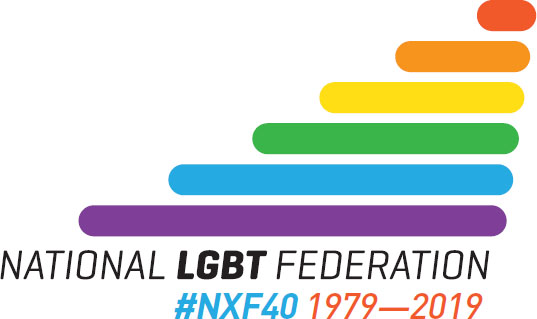NXF: The Community Speaks
by Chris Noone - Chair of NXF Research Subcommittee
As you may be aware of by now, this year we are celebrating the 40th anniversary of the establishment of the National LGBT Federation (NXF). It might also be clear that the objectives of the organisation have changed over time as battles have been won, new battles became possible and different allies came and went.

What you may not be aware of is that the current main objective for NXF, according to our memorandum of association, is “to advance education by the provision of information through the publication of research and through conferences and workshops in order to promote greater understanding of lesbians, gay men, bisexual people and transgender people by society in general and by medical, legal, religious and educational institutions in particular”. This is by no means our only objective, but it is one in which we have had great success – particularly in the past decade. In this piece, we’ll look back at some of these achievements and I’ll invite you to influence where we go next.
The NXF has facilitated a huge amount of research by academics, including much work on the Irish Queer Archive. It has also engaged in its own research. In fact, the NXF was responsible for the first national consultation of the LGBT+ community in Ireland.
The results of this consultation were published in Burning Issues: Listening To The Voices Of The LGBT Community In Ireland in 2009. This work was carried out by a group which included Dr Seán Denyer, Orla Howard, Olivia McEvoy and Ciarán Ó hUltacháin, who were all then members of the board. The results of the survey suggested that, at the time, the most important issues for LGBT+ people in Ireland were equality at work, personal safety, support for young people, support for people coming out, and marriage equality.
Burning Issues had a hugely positive impact by demonstrating and quantifying the effects of these issues. It was cited in subsequent research and policy in the following years as these issues began to be addressed by Irish governments.
Just a few years later, great progress had been made on many of these issues with the success of the Marriage Equality referendum, the passing of the Gender Recognition Act, and the amendment of the Employment Equality Act. This inspired NXF to replicate Burning Issues to ensure that this momentum could be channelled towards what the community wanted to achieve next.
Burning Issues 2 was the largest ever consultation of the LGBT+ community in Ireland. The report – authored by Ciarán Ó hUltacháin, Rachel Mathews-McKay and Bego Urain – highlighted the top ten issues of importance to the community, as well as a demographic profile of the community and a description of experiences related to work, education, personal safety, family, youth and ageing, community, social life, migration and support for other disadvantaged groups.
Burning Issues 2 demonstrated that the priorities for our community at the time were for the government to enact legislation for hate crime, to provide resources for the community in rural areas, to mandate inclusive practices across the public sector and to properly legislate for trans and non-binary equality and healthcare. These are all issues for which the community continues to fight.
One group of people who were specifically identified in Burning Issues 2 as needing more understanding and support were those in our community who have come to live in Ireland from abroad.
Last year, on behalf of NXF, research was carried out to learn more about how LGBT+ migrants can be better supported in Irish society and to empower LGBT+ migrants by involving them in the design and conduct of this research. Dr Conor Buggy, Dr Brian Keogh and described the results of this project in Far From Home: Life As An LGBT Migrant In Ireland. Major areas for reform highlighted by participants included hate crime legislation, healthcare and supporting the most marginalised groups within our LGBT+ community such as asylum seekers. The most pressing changes that the participants in this study would like to see addressed by the Irish government were an easier and more efficient process for LGBT+ asylum seekers entering the country and an end to the current Direct Provision system. This research contributed to the upcoming National LGBT+ Strategy and a recent learning exchange event hosted by the NXF where Irish NGOs had the opportunity to learn from European NGOs on how best to support LGBT+ people who are seeking international protection.
As you can see, the NXF has a rich history of facilitating and conducting research which has an impact on contributing to progress for our community. We wish to continue this and are always open to suggestions and collaborations in this space.